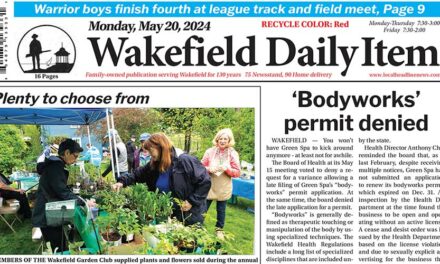
KRISTEN GRIECO ELWORTHY

JENNY SHEEHAN

KIM BAKER DONAHUE
LYNNFIELD — The Town Election on Tuesday, April 9 features a three-candidate race for two seats on the School Committee that have one-year terms.
The three candidates running for a one-year term are former Finance Committee/Public Safety Building Committee member Kristen Grieco Elworthy, Russet Lane resident Jenny Sheehan and Winchester Drive resident Kimberly Baker Donahue.
Voters in all four precincts will cast their ballots at Lynnfield High School from 7 a.m.-8 p.m. on April 9.
The Villager asked the three candidates to answer three questions. The following are their responses.
What do you think are the most pressing issues facing Lynnfield Public Schools, and how should the School Committee address them?
Kristen Elworthy: There are two separate types of issues facing the School Committee currently. The first is related to credibility with residents, parents, administrators and teachers. We need to rebuild that trust in order to be a functional board with buy-in from all of our stakeholders. That starts with every person on the committee being communicative, respectful and willing to have difficult discussions in public. Giving insight into what is happening and how decisions are made will also be important. I’ve seen that the new committee has taken steps towards that process, and I think continuing it with members who are credible and committed to transparency and communication will be key.
We also have some very real challenges and opportunities coming up in the next year. We’ll be starting collective bargaining with the teachers’ union during what we know is a more tenuous environment to do that than ever before. As a committee, we’ll need to balance fiscal responsibility with working with our teachers to ensure they feel valued and are compensated fairly for their work. This starts with building a culture of trust and negotiating with them in good faith, not with predetermined notions. We’ll also be hiring a new superintendent, and looking hard at what our community needs in an educational leader will be an important part of that process.
Beyond that, in listening to School Committee meetings over the past few months — particularly budget meetings — and speaking with parents, teachers and administrators, it’s abundantly clear that our students’ needs have grown larger and more complex than what the district is equipped for. It’s time for a long-term strategic plan that both envisions how to meet the needs of all of our students with appropriate staffing, and how we create a school with the challenging curriculum and educational experience that equips our kids for life after Lynnfield. There are specifics that have been named: A vision for special education, bringing in STEM curriculum and making the high school’s program of courses more rigorous are big ones. But realistically, we need to sit down as not just a committee but also a community to determine our students’ needs and what the vision is for the next generation of education in Lynnfield.
It’s clear to me that this is a moment for us to trust the experts that are in the classrooms and buildings with our students and look to what our needs are going to be many years down the road. Yes, there’s a lot of repair to be done. But this is an exciting moment as well. There is a clear shift in education not just in Lynnfield, but across the country and that’s a moment for us to start thinking about how we can shape an educational experience that serves kids for years down the road.
Jenny Sheehan: There’s been a lot of focus on the issues in our school system over the last few months, but it needs to be said that Lynnfield has a very strong school system. The issues we face largely stem from having a poor administrator in recent years, but at its core Lynnfield has great educators and a fantastic reputation for academic excellence, and we simply need to get back on track. It’s not lost on me that the most important tasks the next School Committee will face include appointing a new superintendent and ensuring our amazing teachers reach a fair and fiscally responsible agreement with our town. However, in the immediate term the challenges we are facing within our schools are multifaceted and vary across each school level. The concerns impacting our youngest learners are not often the same affecting the upper grades, but it’s important the School Committee addresses each to cultivate a learning environment that best supports student achievement.
At the elementary level, it’s important to set up both the teachers and students for success. The biggest issues here have been around increased class sizes, curriculum changes and social-emotional challenges. Larger class sizes hinder individualized instruction and attention. Curriculum changes disrupt continuity, while tasking teachers with learning new frameworks, methodologies and professional development. And without proper social-emotional learning support, student behaviors escalate. Budget priorities and policy support from the School Committee are needed to reduce and then maintain appropriate class sizes. The School Committee should also properly pilot a curriculum before implementing it so the teachers are trained and armed with best practices and professional development support before using it. This was completely botched with the new ELA curriculum, Wit and Wisdom, and needs to be addressed and fixed.
At Lynnfield Middle School and Lynnfield High School, the more pressing issues in my view are around mental health, which was reflected in the Youth Behavior Risk Survey results, where nearly half of the surveyed students answered saying their mental health was “not good.” The middle school in particular has also had major challenges in trying to support and staff within the special education department, and struggling to meet the diverse needs of these students. The School Committee can address these challenges through staffing, continued surveys and community partnerships with A Healthy Lynnfield and similar organizations to create district initiatives to better support our at-risk students.
I believe at Lynnfield High School, the issues around course offerings and curriculum longevity are the most pressing, because as a district we often make cuts from LHS to fund other needs, which jeopardizes the stability of these academic programs. It’s hard for students to enroll in courses if they aren’t confident they’ll be continued. In recent years, we’ve cut foreign languages, changed science labs and more. Ultimately, we lose almost 20 percent of our students to private schools, and I think we should dig into this and work harder to retain them in the district. The School Committee must enhance our district’s competitive edge academically by prioritizing access to diverse and robust course offerings.
Kim Baker Donahue: I think the most pressing issue facing Lynnfield Public Schools is trust. There is broken trust between the teachers and staff and the administration. There is broken trust between the teachers and staff and the School Committee. And there is broken trust between the community and the School Committee and administration. To address this issue, the School Committee needs to lead and operate with as much transparency and honesty as is logistically, realistically and legally possible. It needs to not just listen to questions and concerns, but hear them and respond to them in a timely manner. And when possible, the School Committee should work collaboratively with all parties to arrive at an answer that will serve the greatest number of teachers/students positively. If an answer is not yet known, the School Committee needs to acknowledge that and provide an answer in a reasonable time frame. It’s impossible to make everyone happy, so answers that are provided should be accompanied by the rationale used to get that answer to alleviate as many questions as possible and, in turn, prevent all parties from getting defensive.
Another pressing issue is teacher-staff retention. Recently, we have seen teachers leaving across all schools. We have seen administrators leaving. The School Committee needs to dive into why, and do what it can to address this. Giving the teachers, staff and administrators a voice and working collaboratively with them and getting their input as the experts in their field is critical to finding solutions to problems that arise.
What is your take on the School Department’s proposed FY25 operating budget? How should be the School Committee handle future budget seasons?
Sheehan: Overall, I think the FY25 budget looks good. I was very encouraged to see many of the changes that other concerned parents and I have been advocating for were implemented. The School Committee prioritized the classroom needs and focused on student-facing positions, which had been lost over the past few years. They’re rehiring many interventionists and paraprofessionals at all levels, and hiring kindergarten and first grade teachers to better adjust the large class sizes at our lowest grades. They also made a great plan to better support our Special Education Department by contracting the New England Center for Children (NECC), which could be the start of a great partnership, bringing in curriculum and staff to support our Differentiated Learning Program classrooms. I particularly loved to see the cuts from Central Office staff positions, as our district is too small to support such a top-heavy model in my view. A district with only four schools does not need three superintendents.
That being said, hard decisions had to be made and I think there are opportunities to improve this process in the years ahead. As evidenced by the strong community response to certain cuts that have been made, I think there is opportunity for more communication and collaboration during the budget process, and not after decisions have already been made. Trust in the School Committee is currently in short supply, so we will have to lead with transparency and communication around these very important budget decisions.
Baker Donahue: Great question! The difficulty in answering this question is that, while we, the “public,” have been provided the budget, the line items, the opportunity for public comment, to hear public comment, to see PowerPoint presentations, to hear what the school principals are requesting and finally, to hear the proposed additions and cuts from last year’s budget, we have not had the opportunity to be a part of the discussion, the workshops and the negotiations to truly understand the rationale behind the operating budget that is being proposed.
Having said that, I don’t agree with all of it. I have my own personal views and experiences that influence my thinking, and it is only by continuing to have conversations with current School Committee members, teachers, staff, administrators and parents of our students in elementary school, middle school and high school that I would be able to agree or agree to disagree with some of the decisions. In the end, I believe that we need to present a budget that will provide the greatest amount of “good” for the greatest number of people. Keeping that goal in mind while sharing and communicating the rationale behind certain decisions is how I think the School Committee needs to handle future budget seasons.
Elworthy: I don’t think it’s ever a good feeling to see staff cuts in a budget, from a human perspective, but I do appreciate that the current committee is doing what it needs to do to regain credibility and to present a budget to our town that they can feel comfortable passing. They’ve clearly listened to input from teachers and the community in making their recommendations, and they’ve made some hard decisions. I commend them for their thoughtfulness in what has been a condensed budget season with two new members coming onto the committee.
I also think that the privatized special education classrooms through NECC show a clear interest in being innovative problem solvers, and I really appreciate that. In my discussions with the principals at Huckleberry Hill School and Lynnfield Middle School, it was quite obvious that staffing the DLP classrooms was an inordinate burden, and not solving it was not only drawing resources from other parts of the school (i.e. principals in classrooms instead of 100 percent in their administrative role), but also not serving the students in the classroom properly. It’s really heartening to see the committee come together to figure out a solution and not let another year go by while they assess options. There is no second chance at our kids’ education, and no second chance to retain our valued teachers and administrators who need the right support across the schools to have a positive working environment.
I’ll look forward to assessing that program in the broader scope of special education strategy and vision to see if it’s the right fit long-term, but I think that it’s unquestionably a game-changer for next year.
It’s clear there are some position cuts that are more painful than others. Without being in the room and knowing what else was on the table, I can’t comment on what choice was right — to me, I want to see adding to, not subtracting from, our schools’ ranks each year. But I think it’s a clear indicator that we have to sit down and be realistic about what resources a great school district requires, build a credible budget with a strategic plan behind it and figure out how to best communicate that with our stakeholders and the voters. I’d also look to our principals, as leaders in each of the buildings, for their vision and what kind of resources are required to make that happen.
For the future, I’d like to continue the work this year’s committee has done in ensuring input is gathered from the building principals, representing the teachers. That, at a minimum, should be a starting point. The process should be open and transparent. People will not always agree with each decision, but it should be explained. And voters should clearly understand what is on the table for the budget – and what we’ll lose if we make reductions. Ultimately, it’s their decision.
As for the budget moving forward, I think it’s time to get clear and honest about what the true needs of our students and district are. We will need to be accountable beyond the “year-to-year,” presenting a real vision of what we need multiple years down the road. Our community deserves to understand what the full scope of needs at the schools is, and to decide how they would like to meet those needs.
What skill sets will you bring to the table when the School Committee and the Lynnfield Teachers Association begin collective bargaining in the fall?
Baker Donahue: To effectively negotiate during collective bargaining, it is imperative that the LTA be given an opportunity to communicate its needs and wants and to have an open discussion about the differences between the two. I am trained as a lawyer. Some would say that lawyers are good at arguing and that may be true. But I have always believed that, when working with multiple parties, it is important to “argue” in a healthy way to “fight fair.” One of the key attributes that I bring to any situation is to be a good listener and to be patient.
We need to approach difficult issues, such as collective bargaining, with clarity, accountability, transparency and, most of all, respect and kindness. Disagreements are guaranteed but often, it’s not what you say, it’s how you say it. And I will approach each conversation with gratitude and appreciation because, although it’s our job to work within a budget and to handle “business,” the people who make up the LTA are the “experts” in education and they are the people who are partnering with me, with all of us, in raising our children.
Elworthy: To begin, I think I have a lot of trust and goodwill with the teachers currently. I believe in them, I recognize their value to our district and I think they should have agency and a voice in their roles. I think that’s a great foot to start on with our teachers.
As someone in the public relations industry, my entire livelihood is clear, concise, meaningful communication. I think that’s where the discussions with our teachers’ union start. Whether you’d consider it a skill set or a personality trait, I don’t pull punches and I operate in good faith at all times. My hope is that if the union feels they are negotiating with a committee and superintendent that are showing the utmost in integrity, we’ll be able to build a consensus around a contract where everyone comes out a winner.
I also believe that, based on the trends we are seeing with collective bargaining across the state, we are likely going to be in a position where we will need an operational override to maintain our staffing levels in the schools for the next contract. At that point, I believe my communications skills — which are proven in my other work with town projects such as the public safety project, and in my professional life — will be a key factor for success. Clearly explaining our town’s needs and bringing our community together around a vision for our school district and town will be, as always, what creates progress.
Sheehan: I think my biggest asset for the collective bargaining agreement (CBA) is my experience as a business owner, which requires strong people skills and a focus on data supported decisions to be successful.
As a business owner, I know how to manage both people and operations, and how to communicate respectfully with clients to find creative solutions to problems. Having started my business only a year before the pandemic, I quickly learned how to make hard decisions, particularly around budget. Every day, I balance managing staff versus managing clients, and I understand the give and take process needed to find solutions that work for both parties. Additionally, as a small business without a team of lawyers, I am familiar with reading legal documents like franchise agreements, lease agreements and contracts. It’s important to pay attention to detail when looking to find the middle ground in negotiations. When it comes to CBA, there may be a need to think creatively in terms of budget and policy, and I know these skill sets will prove useful.
Additionally, in any negotiation, there must be a foundation of trust in order for those discussions to be fruitful and fair. Over the last few years, I believe I have developed that trust with many of our great teachers across the district. This stems not only from my time as an active volunteer in the schools, but also from the public statements I’ve made on the record that resonated with our educators at all levels. I have been humbled by the many messages and words of encouragement I’ve received to that effect. Additionally, I believe preparation is the ultimate key to success. Before speaking in public comment at any of the School Committee meetings, I spent time meeting with teachers and administrators, researching policy, collecting data on class size, and more. I fact check and do the research before coming to the table. At the end of the day, the teachers and School Committee both want the best for our students, and I know that we can get there together if we lead with trust, data and preparation. That is exactly what I plan to bring to these very important discussions.





